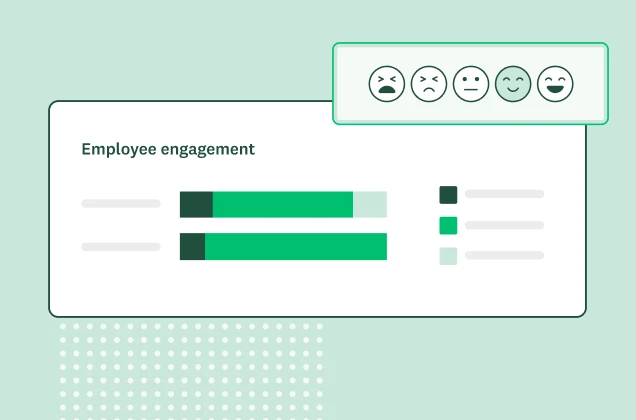Healthcare employee engagement surveys
To care for patients with skill and compassion, healthcare employees need to be engaged, trained, and motivated.
Employee engagement surveys make sure physicians and staff have everything they need to put patients first.
In a recent study, we saw that more than half of healthcare providers measure employee satisfaction as part of their effort to offer great care. If you’re not measuring employee engagement, you could be overlooking a key element that impacts patient satisfaction and—most importantly—health outcomes.
Get an end-to-end engagement solution
Fire up your workforce with an automated, high-cadence engagement program rooted in social science.
How to measure employee engagement in hospitals and clinics
Employee engagement surveys measure how passionate healthcare professionals are about the work they’re doing. They also make it easier to identify changes that will help doctors and staff do an even better job.
Measuring employee engagement in healthcare is vitally important, as employees who are happy tend to provide the kind of care that makes patients happy. In fact, research has shown that engaged employees are more likely to innovate, and they’re more likely to tackle their work with focus, intensity, and enthusiasm.
Fortunately, measuring the engagement of healthcare professionals can also be pretty simple. We’ve developed expert survey template questionnaires to help you get reliable results, and we also offer benchmark data to help you see where you stand in relation to other healthcare organizations.
Creating engagement surveys
Surveys like this might sound complicated, but we make it easy.
Our Employee Engagement Survey Template can help you gain insight into each and every part of the employee experience, from overall motivation to career development. And you can refine those results with other employee questionnaires that measure benefits, relationship management and more.
We can even provide you with benchmarking data for employee engagement, so you’ll be able to measure your progress over time, and compare your success with the success of others.
Putting the data to work
To understand a little more about healthcare employee engagement, we surveyed 717 senior-level healthcare professionals. Our research shows more than half of healthcare organizations use surveys to measure employee satisfaction, and this is what they’re learning:
- More than 60% of employees are satisfied with the training they get from their organization.
- More than 70% are satisfied with the level of interaction they have with patients.
- But only 45% say senior management staff is full of good communicators.
This last number provides administrators with a unique opportunity. Rather than focusing on managing a medical practice more efficiently, experts at these facilities might want to invest in new communication tools. Or they might want to foster more face-to-face meetings between junior level and senior level staff. Some might even focus on multitasking, as stressed employees might be more likely to be disengaged.
Do these findings hold true for your organization? A well-crafted survey can provide you with the granular detail you need to help employees do a better job.
Medical surveys for healthcare professionals
Expert survey templates can make it simple to create engagement surveys, but there may be specific topics you want to ask about that aren’t covered. Here are a few ideas to help you write good survey questions:
Be conversational: In healthcare surveys you write for patients, you should work hard to eliminate the slang, lingo and abbreviations that pop up around healthcare facilities. But in surveys for healthcare professionals, you’re writing for your peers. It’s fine to use the language everyone understands.
Assure confidentiality: In the introduction to your survey, remind your readers that you won’t attach their names to the answers they provide. Few employees will feel comfortable being open and honest about sensitive work-related feelings (like safety issues or the performance of others) if they think it could be tied back to them.
Keep it (relatively) short: Our research suggests that response rates for surveys tend to drop when participants are asked more than 10 questions. But measuring employee engagement is a tricky business, so you might need to ask a lot of different questions in different ways. Do try to keep the survey short, however, and remember that you can always follow up with another set of questions at a later date.
Track your progress: Setting up internal benchmarks allows you to compare your scores as they change with time. But you can also use SurveyMonkey Benchmarks to compare your responses with hundreds of other organizations.
For more survey writing ideas, check out our survey best practices.
Discover more resources

Human Resources Leader
HR leaders can use this toolkit to help drive exceptional employee experiences.

Get feedback you can act on with online evaluation forms
Unlock the power of feedback with SurveyMonkey's online evaluation forms. Start with our form builder today!

4 mistakes to avoid when creating online application forms
Learn how to create powerful online application forms and avoid common pitfalls.

Deliver the right workplace benefits
SurveyMonkey gives you the tools to find out how your employees feel about their benefits, so you can design the right package.